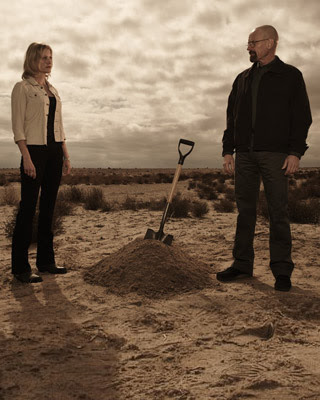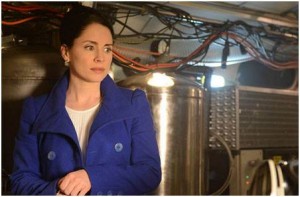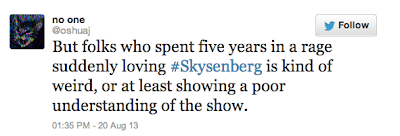 |
| Skyler is calling the shots now. |
Warning: Spoilers Ahead
Throughout the last five seasons of
Breaking Bad, the female characters have played key roles–from playing adversaries to aiding and abetting–yet they are often overlooked as secondary characters. In fact, a
recent article in
The Atlantic doesn’t even mention any of the female characters (save for a passing mention of Jane being a “lovely” secondary character in an infographic). While Walt and Jesse are the focus of the series, and they operate in a largely masculine and man-centric world, without Skyler and Lydia, they would have been stopped long ago.
Skyler thought of the car wash. She got the car wash. She laundered the money and kept it safe. She kept the IRS away from her boss and her household. She is consistently rational and protective of her life and her family.
Lydia provided an “ocean” of methylamine. She had threats to the business taken care of. She expanded the operation overseas, and won’t settle for disappointed customers. She is fiercely in charge of her business.
Marie figured out the details of Skyler and Walt’s deceptions quicker than Hank did. She’s willing to attempt to steal–baby Holly this time, not a spoon–to punish Skyler and protect her niece.
Is there a new holy trinity in Albuquerque?
We can’t help but think about the juxtaposition of scenes in last summer’s “Fifty-One” when Skyler submerges herself in the pool and we cut to Lydia at an electrical grid. Each episode, these two become increasingly invested in and in control of producing and protecting Walt’s legacy. Skyler confronted Lydia at the car wash, but that was her home turf. Surely they’ll meet again–and that meeting (like the water and electricity) could be deadly.
(It’s important to note that this most recent episode, “Buried”–perhaps the most woman-centric of the series–was also directed by Emmy-nominated Michelle MacLaren, who some critics consider the show’s “best director.” Another fun fact? A female chemistry professor is the show’s “lead meth consultant.”)
However, the male characters (and audience members) habitually underestimate the women. Hank assumes Skyler is an innocent victim. “Ladies first,” Declan says to Lydia.
In “Buried,” Skyler and Lydia are rising to the top of their prospective enterprises.
Skyler covers a sickly Walt with a feminine quilt, comforting him, and nursing him back to health. “Maybe our best move here is to stay quiet,” she says, acknowledging that to keep the money and keep all of them relatively safe, they need to not talk. She reassures Walt that Hank seemed to have “suspicions, but not much else.” (She knows this because Hank corners her in a diner and tries to get her to talk and give him something–she refuses, screaming “Am I under arrest?” to get out of the situation.) Hank calls her a victim. By the end of the episode, it is clear that Skyler’s no victim. How far could Walt have gotten without her?
 |
| The feminine is highlighted in “Buried,” and given great power. |
Lydia visits the meth lab in the desert, where Declan and company are making meth that is not up to her or her Czech clients’ standards. “It’s filthy,” she says of the lab. “What are you, my mother?” Declan responds. They underestimate Lydia. If they would have listened to her and followed her pure-meth protocol, perhaps they would have survived. She covers her eyes as she walks past the carnage that she ordered (she was brought to the desert blindfolded, and chose to leave blindly). She steps next to corpses with her feminine, red-soled Christian Louboutins.
 |
| If the cooks had listened to Lydia, things would have ended differently. |
Lydia often isn’t focused on as a main character, but those Louboutins are carrying her into a pivotal role. But will she be taken seriously? A critic at
Slate said, “Her girliness is annoying—calling Declan’s lab ‘filthy’ was sure to make him reference his mom—but she also happened to be right. The man had no standards.” Would Walt have been “annoying” if he had critiqued the way a lab was run? Probably not.
Even with Skyler and Lydia’s power plays and scheming, too many are still focused on the likability of the female characters. (In a
thread on
Breaking Bad‘s facebook page right now, hoards of people are calling for Skyler to be beaten or killed.) Lydia is too “girlish.” And Marie?
“She is so annoying that she deserves to die.”Critics and audiences wring their hands over who we’re “supposed” to like in Breaking Bad. If we operate in high-school superlative absolutes of “most likable” and “most hated,” how would Vince Gilligan have us categorize the characters? Are we truly supposed to feel good about liking anyone but Jesse?
In reality, we’re allowed to like male characters who maim, kill and hurt children. We’re allowed to root for male anti-heroes and revel in their dirty dealings. The women? Well, if they’re not likable, Internet commenters want them dead.
In “She Who Dies With the Most ‘Likes’ Wins?” Jessica Valenti
argues,
“Yes, the more successful you are—or the stronger, the more opinionated—the less you will be generally liked… But the trade off is undoubtedly worth it. Power and authenticity are worth it… Wanting to be liked means being a supporting character in your own life, using the cues of the actors around you to determine your next line rather than your own script. It means that your self-worth will always be tied to what someone else thinks about you, forever out of your control.”
And while I’m fairly certain Valenti wasn’t cheering on money launderers, murderers, or meth dealers, the women of Breaking Bad have appeared to break bad. Their moves will undoubtedly decide the course of the rest of the series.
Audiences, though, too often want to box female characters into “likable” and “hate and kill” categories. While Skyler populated the latter category for years, it seems as if people are now–to an extent–trying to wedge her into the “likable” category. (
This critic lauds her as the “best character” on
Breaking Bad, and describes her as a wife and mother and extols the virtues of her as a moral center–why does she have to be moral to be a good character? Is it because she’s a woman?)
The Breaking Bad social media team coined #Skysenberg after “Buried,” showing that Skyler has crossed over and fully enmeshed herself with Heisenberg. (This is awfully and misguidedly close to her taking her husband’s name and adopting his characteristics. Because Skyler isn’t necessarily doing what she’s doing to protect Walt.)
This symbolic move into Walt’s court, though, won her some new fans:
 |
| Ugh, awful women. |
 |
| High five, bro! |
 |
| Heisenberg is sacred–no girls allowed! |
 |
| And that’s what’s most important. |
 |
| Yes. You’re right. Everything he did was for her. |
 |
| Ding ding ding! |
Skyler doesn’t care if you like her. Neither does Lydia. Or Marie. Gilligan himself recognizes the hatred and
has said, “I think the people who have these issues with the wives being too bitchy on
Breaking Bad are misogynists, plain and simple.” Skyler, Lydia and Marie are poised to decide the outcome of
Breaking Bad. Skyler is calling the shots instead of Heisenberg. Lydia is decimating–and will certainly replace–a drug cartel. Marie desperately wants to see Walt and Skyler punished; her desire for revenge seems to overshadow Hank’s desire to protect his career.
In the excellent “I hate Strong Female Characters,” Sophia McDougall points out that
“If Strong-Male-Character compatibility was the primary criterion of writing heroes, our fiction would be a lot poorer. But it’s within this claustrophobic little box that we expect our heroines to live out their lives.”
Skyler and Lydia especially are clearly breaking out of these boxes, and Marie isn’t very far behind. But aren’t women supposed to be moral centers? Aren’t their roles as “wife” and “mother” supposed to define them? Aren’t they supposed to not get their hands dirty? We are so accustomed to enjoying and eagerly watching male antiheroes, but watching female characters embody the same traits has been, until now, incredibly rare.
At this point in the series, though, these complex female characters are calling the shots. (“The men are basically just sitting around diddling themselves,” my husband said.)
We don’t need to like female characters for them to be well-drawn and powerful (just like we don’t need to like Walt). We need to get over that. Skyler, Lydia and Marie aren’t just wives and/or mothers anymore. The are characters–not just female characters, or worse yet, “strong female characters.” They are effective and compelling, just how characters who happen to be women should be.
Skyler isn’t Skysenberg. She’s Skyler. And she’s got this.
 |
| Are we done here? |
________________________________________________________
Leigh Kolb is a composition, literature and journalism instructor at a community college in rural Missouri.











The most scaring about all those “We hate Skyler and want her dead” comments on the web was the incredible amount of hating and shouting women. I was really, really scared about this and one of the few who acknowledged the character from the very beginning.